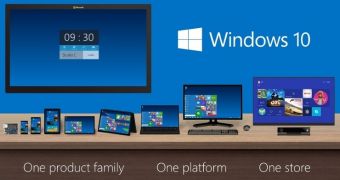Microsoft is making big efforts to convince more companies to release devices running its revamped Windows operating system, but as far as the mobile business is concerned, not everyone thinks that the software giant is going in the right direction.
Case in point, Asus, a company that has been working with Microsoft for years but that now believes that Windows isn't quite the right choice when it comes to building new phones that can sell in high numbers.
Asus chairman Jonney Shih has reportedly explained that the number one feature of Windows is productivity and this is what makes a PC feel so good. Windows allows you to be productive with a mouse and keyboard, but on mobile phones, this thing no longer exists because of the small screen, he says.
Moreover, he adds that supporting Windows 10 Mobile right now isn't quite the best choice and explains that going for Android is a decision that could help bring in more cash because most customers are still interested in this particular mobile platform and want powerful smartphones at low prices.
Windows 10 Mobile coming in the fall of 2015
But bringing Windows productivity on smartphones is exactly what Microsoft is trying to do right now, and Continuuum for Phones is living proof.
Microsoft demoed at BUILD 2015 a new feature called Continuum, which basically turns any phone running Windows 10 Mobile into a small PC when connected to a computer with a USB cable. The phone's screen is mirrored on the PC monitor, and all the work you do on your computer is actually performed on the phone, so you can edit documents, browse the web, or send emails right from the handset.
This should make Windows 10 Mobile devices a lot more productive, and Shih believe that this could help, but more time to make this possible is still needed. New hardware would be needed for Continuum for Phones, so it would still take a while until the market fully adopts this new feature and more customers get to try it.
At the same time, Microsoft is also trying to make Windows 10 Mobile a better rival to Android by bringing support for Android apps in its own platform. Porting an app that was initially designed to run on Android is now easier and can be done with small tweaks, which Microsoft hopes would finally address the lack of apps that has impacted Windows Phone for so long.
And, what's more, Redmond is adopting a strategy that could counter Android's impressive growth in emerging markets, where cheap devices are still incredibly popular. Microsoft has been mostly about budget models lately, and several new devices have been launched in developing markets, in an effort supposed to slow down Android's growth and help the company gain market share.
Flagships are not yet a priority, but they will arrive later this year, Microsoft explains, but for the moment, fighting Android in the budget sector is much more important, it seems.
Time will tell if Windows 10 Mobile has what it takes to compete against Android and iOS, but without support from OEMs, Microsoft might really have a very difficult mission in the next few years.

 14 DAY TRIAL //
14 DAY TRIAL //